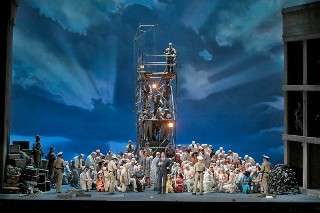|
Back
Beethoven Deserves Better New York
Metropolitan Opera
03/16/2017 - & March 20,* 24, 28, April 1, 5, 8, 2017
Ludwig van Beethoven: Fidelio, opus 72
David Portillo (Jaquino), Hanna-Elisabeth Müller (Marzelline), Falk Struckmann (Rocco), Adrianne Pieczonka (Leonore), Greer Grimsley (Don Pizarro), Klaus Florian Vogt (Florestan), Günther Groissböck*/James Morris (Don Fernando)
Metropolitan Opera Orchestra and Chorus, Sebastian Weigle (conductor)
Jürgen Flimm (production), Robert Israel (sets), Florence von Gerkan (costumes), Duane Schuler (lights)

(© Ken Howard)
Beethoven’s only opera sits on the edge of the standard repertoire and lacks universal popularity. The reasons are plain to see. The opera features two plots – an ambiguous romance between the young guard Jaquino and the jailer’s daughter Marzelline and a loftier tale of a wife’s willingness to sacrifice herself to save her husband – that never quite cohere. The score has wonderful moments, but not Beethoven’s symphonic best. The gorgeous choruses and ensembles are strung together with dialogues that are often awkward and stilted. Basic information driving the plot is missing. We never learn, for example, why Florestan is in prison or why Pizarro want to kill him. Nevertheless, the opera deserves its place in the history of the art form because of Beethoven’s relatively strict adhesion of words to music. It emerges from a late eighteenth-century shift from opera seria to the dramatic music – or music drama – that led to the German Romantic tradition and opera’s nineteenth-century apogee.
Fidelio enthusiasts (and there are some) will have little to celebrate in this Met revival of Jürgen Flimm’s production, which was restaged with the director’s participation. The sets remain a stark reminder of modernity, not merely gritty as they were at the premiere, but now an unintentionally ominous reminder of the police states and refugee crises we hear so much about. The prisoners are somewhat naively dressed in white, suggesting liberation from their cruel confinement. The scene is ennobled by their stirring chorus, and here the Met was at its very best musically that evening. The visual message is nevertheless a bit too obvious. Other aspects of the production remain intrusive. Florestan’s place of imprisonment is reached by a long steel ladder that the characters must go up and down. It just looks stressful. And this time there seemed to be a proliferation of firearms on stage. Originally, as I recall, Leonore pulled a gun on the cruel Pizarro to prevent him from killing her husband. But here everyone has a gun: Marzelline cleans one as the curtain rises. Pizzaro acts with one in hand as he fantasizes about killing Florestan. Florestan takes one from him as Leonore rescues him, and so on. The effect is, as we hear in the public discussion of guns in America, desensitizing.
The musical effort struggled to take us out of the doldrums. Sebastian Weigle led a restrained performance that weakened the best moments while failing to impart any real grandeur. Klaus Florian Vogt’s Florestan revealed a sweet, amply voiced tenor, but the voice may sit a bit too high for the role’s graver demands. Adrianne Pieczonka has built a moderately renowned international career in the dramatic soprano repertoire, but her Leonore was oddly listless. Her major aria tended to be too sharp to capture the character’s warmth. Greer Grimsley suffered from some vocal dryness in the declamatory part of Don Pizarro, the cruel prison governor. The role should have gone to the evening’s Don Fernando, the much steadier German bass Günther Groissböck, who is entering the prime years of a stellar career. David Portillo’s Jaquino was wimpier than the character needed to be. His Marzelline, soprano Hanna-Elisabeth Müller, showed rather greater promise, though the role does not give an aspiring artist much to work with. If the evening had a star, it was Falk Struckmann, a consistently solid performer, whose Rocco drew on firm bass tones and refined technique to produce sympathy. Sadly it could not save a disappointing performance.
Paul du Quenoy
|